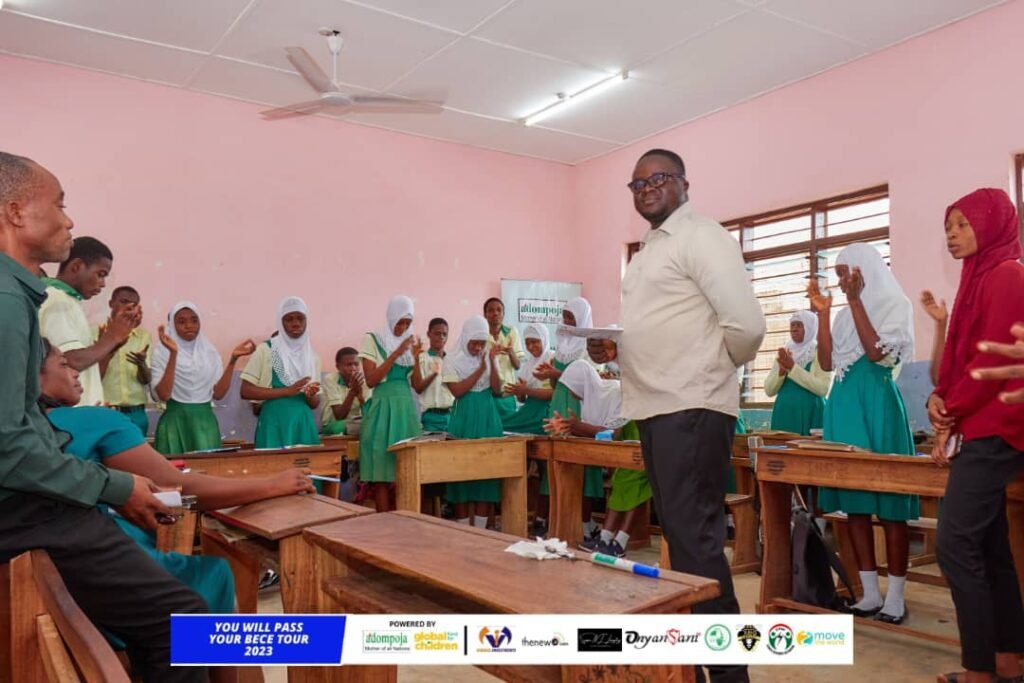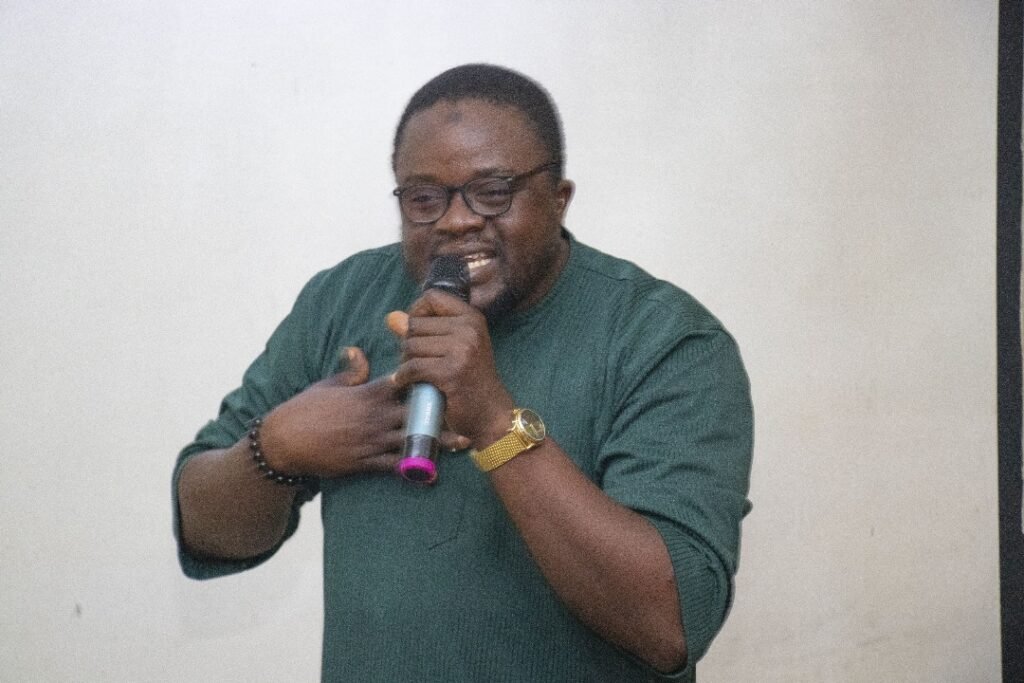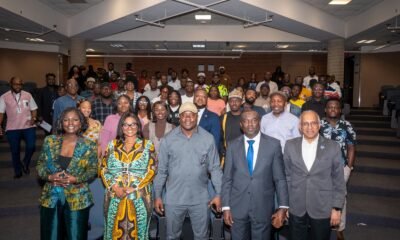News
Digital identity and address systems made it possible for Ghana’s digitalisation to take off – Bawumia

Vice President and flagbearer of the NPP. Dr. Mahamudu Bawumia, has underscored the significance of the digital identity and address systems to modern economies and nations.
Speaking during his campaign tour of Dome Kwabenya Constituency in Accra on Thursday, Dr. Bawumia said developed economies have gone ahead leaving African countries behind, because their economies went digital, adding that, for African countries to catch up, there is the need for African economies to also go digital.
Dr. Bawumia, who has passionately spearheaded Ghana’s remarkable digitalisation drive, said he proposed that African economies should go digital in order to achieve economic transformation, in a book he wrote 14 years ago.
“I wrote a book in 2010 – ‘Monetary Policy and Financial Sector Reforms in Africa” and I made the point that Africa needs to go digital. That if we don’t go digital, we are going to be left behind because the digital revolution is the key for African economic development,” Dr. Bawumia told a diverse audience.
Having written the book six years before he became Vice President, Dr. Bawumia said once he got the opportunity to serve as Vice President, he knew exactly where his focus should be, with the blessings of President Akufo-Addo.
“When I came into office, I focused on one area which is digitalisation of the economy,” he said.
According to him, “I focused on it for a good reason because in the modern economy digitalisation is key to solving a lot of problems not only in Ghana but across Africa.”
Dr. Bawumia, however, added that for Ghana’s digitalisation to successfully take off, a solid foundation needed to be built, because without those foundations, digitalising the economy could not have been achieved, hence his focus on that.
“There are things you have to do first if you want to enter the digital world. First, your citizens must be digitally identified. That’s why we said let us issue the Ghana card and the Ghana Card has been issued,” he said.
According to him, “85% of adults in Ghana now have the Ghana card. We have issued 18 million Ghana cards and that makes Ghana the leading country in sub- Saharan African for digital identity. Today, even children who are born in Ghana, we are giving them digital identities just as it happens abroad.”
The Vice President added that “We give them an identity number at birth. We have linked that Ghana card with the birth and death registry so that integration of those systems is allowing Ghana to do something that no other country in the world has been able to do.”
Another digital foundation Dr. Bawumia said he focused on, which he noted is essential to creating a digital economy, is digital address system.
“When we came into office, Ghana was not having an address system that was working throughout the country… But an address system is TV one of the most important elements for any modern economy,” Dr. Bawumia said.
“An address system is so important that today, if you go to the United States and you collapse their address system; just erase it, if you could, that economy will collapse because you can’t function. The businesses cannot function without an address system,” he stressed.
Dr. Bawumia stated that when he remained committed to building these structures for a strong and efficient digital economy for Ghana, many, who did not understand the linkage between digitalisation and economy, questioned what he was doing and also sought to mock him.
“When I started, many people could not understand how digitalisation related to the economy and so increasingly, they are now beginning to understand,” he concluded.
News
Man narrowly escapes death, accused of stealing 19 fowls, a dog
A 42-year-old man, Kwabena Otoo, narrowly escaped death on the dawn of Monday when residents of Assin Adubiase lynched him, having been accused of stealing 19 fowls and a dog.
“I heard the commotion from my house,” said a resident who wished to remain anonymous. “By the time I reached the scene, there was already a crowd surrounding him. His pleas for mercy were drowned by angry voices.”
Otoo, bleeding profusely and severely injured, might have lost his life if not for a timely distress call to the Assin Fosu Divisional Police Command.
Officers arrived around 4am, pushing through the mob to rescue the battered man.
“We found him in critical condition,” shared one responding officer. “Every minute counted in getting him medical attention.”
Now recovering at the Assin Fosu Polyclinic, Otoo suffered physical wounds but also faces uncertain future as investigations continue.
Medical staff report indicated that he suffered multiple injuries requiring immediate treatment.
Community members claim Otoo’s contradictory answers during questioning triggered their suspicions and subsequent assault.
One witness explained that, “people here have lost too much to thieves… frustration has been building for months.”
The Police have confirmed Otoo is from neighbouring Assin Odumase and are calling for anyone missing fowls or a dog to come forward as part of their investigation.
“This could have ended in tragedy,” warned a police spokesperson. “We understand community frustrations, but mob justice is never the answer. We urge citizens to report crimes rather than taking matters into their own hands.”
From Kingsley E. Hope, Kumasi
News
Abubakar Zico Newton changing educational narrative in Madina Zongo

Chancing on a report indicating that people with pre-school experience were likely to be in school far more than those without pre-school education was the spark Ishaq Abubakar Zico Newton needed to turn around the fortunes of young people in Madina Zongo.


Growing up in the same community where pre-school was not valued as he himself was not a beneficiary, Ishaq Abubakar Zico Newton decided to change the narrative of the children with the help of his mother’s already established foundation.
The foundation started on the compound of his home as an afternoon classes for children in the community.
“It was the brainchild of my aunt who never had the opportunity to go to school but always felt that education was going to be the game-changer in the near future.”


With this in mind, his aunt started a free after school classes in the afternoon.
The classes helped children with their home works as their parents could neither read nor write. This single act by his aunt really impacted the lives of most children in the community.

“My mother took over after the death of my aunty when she returned from Germany and thought it wise to create a foundation around it. She named it ‘Mother for all Foundation.’’’
She later took the foundation to another level by supporting the foundation with books for the children and paying the teacher to continue the afternoon classes.
In 2010, King Zico, as he is affectionately called in the community, felt the need to support his mother’s idea and take the foundation a notch higher.

With his educational background, he turned it into a pre-school for children in Madina Zongo where children from the ages of two to five years have access to free pre-school education.
Currently, there are about 250 children in the school which initially started with only two children.
“The goal of the foundation is to educate and also help improve on the educational standard of the people within Madina Zongo,” he said.
According to Mr Newton, most of the people supporting the foundation were beneficiaries of the afternoon classes started by his aunt.

He said the foundation embarked on several projects including a ‘Readcamp’ aimed at enhancing the literacy skills of school pupils, a play-based training programme for educators and facilitators with innovative tools to transform classrooms.
“Other projects included mask up and sanitise campaign and covid-19 food relief project,” he stated.
He said that over the period of eight years, close to thousand youths and children have had their lives transformed through the foundation.
Background
Zico loves to describe himself as Zongo boy who at a point realised that actors of change are community people who wish to see the change in their communities.
He grew up from a very deprived family where he and his siblings as well as friends had to go look for mangoes in the bush and sell.
At other times “we looked for ‘alumi’ in the gutters and in people’s homes and at times we have just pick peoples cooking utensils at their blind side, crash them and sell,” adding that “that was how we survived.”
Education
King Zico never had a pre-school experience. He started school at Gospel International School in Madina Estates. After owing so much in terms of fees, he secured a scholarship from the school.
This followed the headmaster’s decision to allow him attend the school for free because it was obvious he couldn’t pay.
He move from there to the Faith Community Baptist School where he had my Junior High School (JHS) education

King Zico continued to the West African Secondary School (WASS) but could not write the final examination because “my name was synonymous to school fees arrears.”
King Zico later registered for Nov/ Dec and continued to the Institute of Professional Studies (IPS) now University of Professional Studies, Accra (UPSA) where he studied Diploma in Business Studies (DBS) with accounting option.
“I was of the hope that I will be able to secure a job with the certificate, but unfortunately, I did not, so I ended up on the streets again and did some basic jobs and finally enrolled myself into the African University College of Communication.’’
Hobby
At his spare time, King Zico loves to listen to music and enjoys rice and stew at any given time.
By Esinam Jemima Kuatsinu











